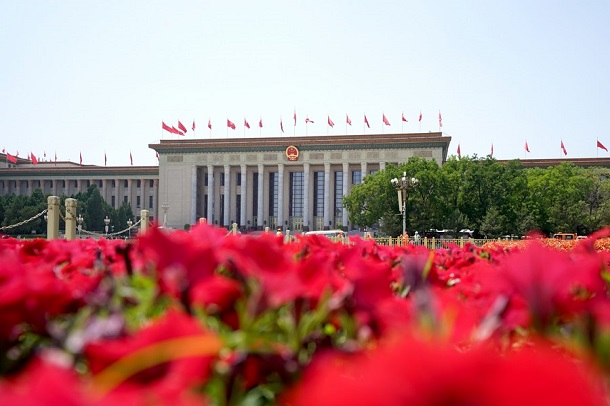Xi's insights chart course for progress

File photo shows a view of the Great Hall of the People in Beijing, capital of China. [Photo/Xinhua]
Officials, experts underscore president's emphasis on people-oriented approach
For Li Guoqin, a national legislator from the Inner Mongolia autonomous region, the most anticipated moment of the National People's Congress sessions over the past four years has been sitting down with President Xi Jinping to discuss top issues facing the nation.
A key message extended by the president during the deliberations, said Li, who is a village chief in Duolun county, was that the nation must give top priority to the interests of the people, closely rely on the people and keep delivering more tangible benefits to the people.
Xi, who is also general secretary of the Communist Party of China Central Committee, was unanimously elected by the regional people's congress as an NPC deputy in January 2018.
Li was among the five deputies who shared their insights with Xi during the delegation's deliberations last year, during which Xi urged the region to stick to a people-centered development philosophy, prevent the recurrence of poverty and strive toward common prosperity. Xi has also spoken about the need to protect the region's environmental ecology and promote ethnic unity over the past four years.
"From our conversations, I can tell that the people are what concerns him most, and his remarks have inspired us to make our home better," she said.
As the annual sessions of the nation's top legislature and top consultative body are set to open in Beijing later this week, officials and political analysts have highlighted the significance of Xi's discourse, especially his strong emphasis on staying people-oriented, in charting the course of China's development.
Wang Feng, an associate professor on the history of the CPC at the School of Marxism of Beijing Normal University, said Xi has always made the people his top concern, a consideration that has been evident in the president's deliberations with national legislators and political advisers over the past nine years.
In March 2013, while speaking with NPC deputies from Shanghai, Xi emphasized the need to pay more attention to disadvantaged groups and enable the public to receive tangible benefits from the Party and government.
The president has made poverty alleviation the centerpiece of his political agenda, and during the annual two sessions he has made strong appeals for measures to relieve the burden of disadvantaged people in rural areas.
During deliberations with deputies from Guizhou and Gansu provinces-areas where rural poverty has been more acutely felt-Xi called for unremitting measures to bring tangible benefits to poor people, while cautioning against false methods and work styles that only show statistical improvements.
"The remarks made by Xi have profoundly explained in detail that the CPC sees the people's situation as the fundamental position for all its decisions, policies and work," Wang said.
Gong Mingzhu, head of the Inner Mongolia Development and Reform Commission, said Xi, as an NPC deputy, has paid close attention to the development of various causes in the region and mapped out strategies and action plans.
Xi's remarks and instructions have pointed the way forward, outlined guiding principles and injected strong impetus into the region's growth, he said.
To beef up ecological protection, Inner Mongolia has classified half of its regions as key areas for ecological protection and come up with strong measures to treat air, water and soil pollution, he said.
Local authorities have also rolled out major steps to guarantee and improve public well-being, with the incomes of urban and rural residents up by 7.3 percent and 10.7 percent respectively year-on-year, he added.
Li, the legislator, said that inspired by Xi's instructions, her village, which is made up of herders, has improved ecological protection after imposing a grazing ban to rehabilitate previously damaged grassland.
Even though herders are raising far fewer sheep than before, their incomes have increased substantially after the introduction of better breeds, she said. The yearly per capita income of villagers has increased from 18,000 yuan ($2,850) in 2018 to 22,000 yuan last year.
Ma Liang, a public administration expert at Renmin University of China, said Xi's remarks have played an instrumental role in promoting the region's high-quality growth, enhancing the efficiency of governance and improving people's quality of life.
- Chinese president appoints new ambassadors
- Top legislature schedules upcoming session in October
- China's top legislator meets Liberian senate president pro tempore
- China's top legislator meets Cambodia's National Assembly president
- China urges Group of Friends of Neutrality members to reform and improve global governance



